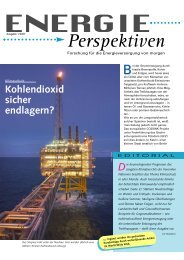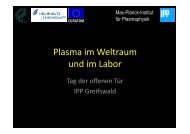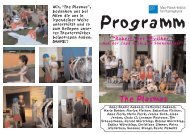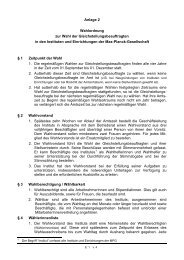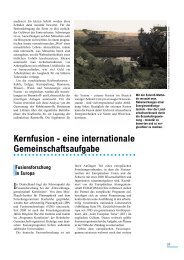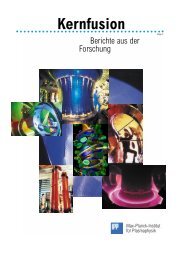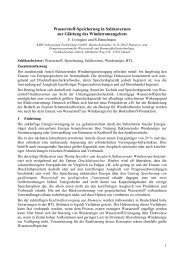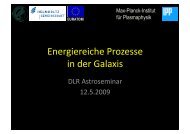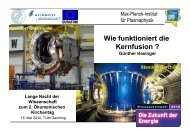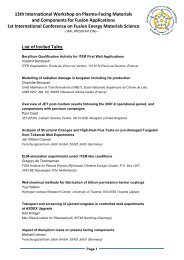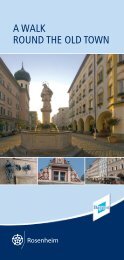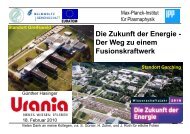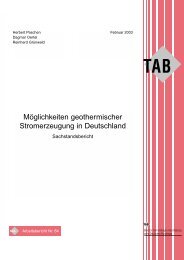IPP Annual Report 2007 - Max-Planck-Institut für Plasmaphysik ...
IPP Annual Report 2007 - Max-Planck-Institut für Plasmaphysik ...
IPP Annual Report 2007 - Max-Planck-Institut für Plasmaphysik ...
You also want an ePaper? Increase the reach of your titles
YUMPU automatically turns print PDFs into web optimized ePapers that Google loves.
In <strong>2007</strong> there were some retirements<br />
of members of the Board<br />
of Scientific Directors at <strong>IPP</strong>.<br />
Prof. Behringer left <strong>IPP</strong> in August.<br />
To elect his successor within a<br />
joint appointment of Augsburg<br />
University and <strong>IPP</strong>, a colloquium<br />
took place at Augsburg University<br />
on December 11 th . In consequence<br />
of the retirement of<br />
Prof. Fußmann, the cooperation<br />
with the “Humboldt-Universität<br />
zu Berlin” ended in September.<br />
A concept for a new cooperation with the Technical University<br />
Berlin is in progress and is expected to be signed in 2008.<br />
Since fusion-relevant physics and engineering are not the most<br />
prevalent subjects in Germany’s academic landscape, sparking<br />
student’s interest in high-energy plasma physics and other<br />
fusion-relevant fields is a duty and delight. Teaching at universities<br />
therefore has a sound tradition at <strong>IPP</strong>. In <strong>2007</strong> there<br />
were about 107 contact hours at universities or universities<br />
of applied sciences in Germany or neighbouring countries:<br />
Augsburg, Bayreuth, Bochum, Ghent, Greifswald, Helsinki,<br />
Munich, Padua, Stralsund, Tübingen, Ulm and Vienna.<br />
Lecturing at universities is supplemented by the <strong>IPP</strong>’s<br />
“Summer University in Plasma Physics”: one week of lectures<br />
Country Postgraduates Postdocs<br />
male female male female<br />
Australia 1<br />
Austria 1<br />
Canada 1<br />
Chile 1<br />
Czech Republic 1<br />
France 1<br />
Germany 30 9 10 1<br />
Greece 1<br />
India 2 1 1<br />
Italy 3 1 1<br />
New Zealand 1<br />
Poland 1 1<br />
Romania 1<br />
Russia 1 2<br />
Spain 1<br />
The Netherlands 1<br />
Ukraine 1 3<br />
United States of America 1<br />
Yugoslavia 1<br />
38 14 26 3<br />
52 29<br />
Table 1: Countries of origin and sex of the 52 postgraduates and 29 postdocs<br />
at <strong>IPP</strong> (31.12.<strong>2007</strong>)<br />
Cooperation with Universities<br />
Author: Dr. Axel Kampke<br />
Many important goals in plasma physics and<br />
materials science have to be met on the way to<br />
a fusion power plant. Since this process will<br />
last another generation, <strong>IPP</strong> attaches great importance<br />
to the training of young scientists. The<br />
close interaction with the universities in teaching<br />
and research is therefore an important part<br />
of the mission of <strong>IPP</strong>. It has also borne fruit in<br />
recent years. Moreover, the joint projects, which<br />
exist with several universities, form an integral<br />
part of the <strong>IPP</strong> research programme.<br />
105<br />
given by <strong>IPP</strong> staff and lecturers<br />
from partner institutes providing<br />
detailed tuition in nuclear<br />
fusion – in <strong>2007</strong> for the 22 nd<br />
time at Greifswald.<br />
The international character of<br />
fusion research is also reflected<br />
in the countries of origin of graduate<br />
students at <strong>IPP</strong>: one fourth<br />
of the postgraduates and more<br />
than 60 per cent of the postdocs<br />
are from abroad. Table 1 shows<br />
the distribution with respect to<br />
country and sex of the 52 postgraduates and 29 postdocs at<br />
the end of <strong>2007</strong>. Due to the restricted time for their work at<br />
<strong>IPP</strong> the total numbers of supervised postgraduates and postdocs<br />
within <strong>2007</strong> are higher by a factor of 1.3 than the above<br />
mentioned numbers.<br />
In addition, <strong>IPP</strong> uses specific instruments developed by the<br />
<strong>Max</strong> <strong>Planck</strong> Society, the Helmholtz Association and the<br />
Deutsche Forschungsgemeinschaft (DFG) for more intensive<br />
networking with universities on a constitutional basis:<br />
• participation in the DFG Collaborative Research Centre<br />
Transregio 24, “Fundamentals of Complex Plasmas”, at<br />
Greifswald University<br />
• the “International <strong>Max</strong> <strong>Planck</strong> Research School on Bounded<br />
Plasmas” at Greifswald in cooperation with Greifswald<br />
University<br />
• a “Helmholtz Virtual <strong>Institut</strong>e” together with the Universities<br />
of Stuttgart and Karlsruhe and Karlsruhe Research<br />
Centre<br />
• two “Helmholtz Young Investigators Groups” – “Computeraided<br />
Materials Sciences”, headed by Dr. Ralf Schneider,<br />
and “Theory and Ab Initio Simulation of Plasma Turbulence”,<br />
headed by Dr. Frank Jenko – in cooperation with<br />
the Universities of Greifswald and Münster, respectively,<br />
• the “<strong>Max</strong>-<strong>Planck</strong> Young Investigators Group” “Turbulence<br />
in Magnetised Plasmas”, headed by Dr. Wolf-Christian<br />
Müller, and<br />
• the “Young Investigators Group” “Zonal Flows”, headed by<br />
last years “European Young Investigator Award” winner<br />
Dr. Klaus Hallatschek.<br />
The young investigators groups got founded a common 500thousand-Euro-Linux-Cluster<br />
by the Helmholtz Association.<br />
In 2006 <strong>IPP</strong> was successful within the “Excellence<br />
Initiative” of the German government; the proposals for<br />
“Munich Centre for Advanced Photonics” and “Origin and<br />
Structure of the Universe” – both in cooperation with LMU<br />
and TUM – were accepted as “Clusters of Excellence”. In<br />
<strong>2007</strong> “Origin and Structure of the Universe” was officially<br />
established in the former “ITER building” of the <strong>IPP</strong>.



